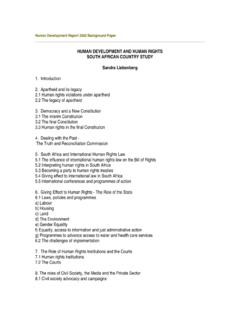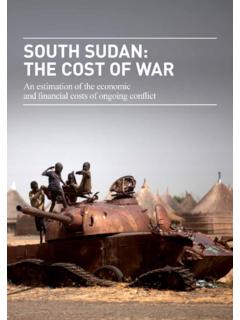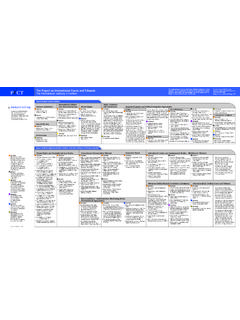Transcription of STATE OF THE ARCHIVES - Archival Platform
1 PREPARED BY THE Archival PLATFORMSTATE OF THE ARCHIVES :An analysis of south Africa s national Archival system, 2014 The Archival Platform , 2015 The Archival PlatformUniversity of Cape TownPrivate Bag X3 Rondebosch 7701 Website: : @the_archiveFacebook: The Archival PlatformEmail: credits: Jo-Anne Duggan / Archival PlatformDesign: Jos Thorne, Local Legends Design StudioThe preparation and publication of this report has been made possible through the generous support of The Atlantic Philanthropies for the work of the Archival OF THE ARCHIVES :An analysis of south Africa s national Archival system, 2014 PREPARED BY THE Archival PLATFORMEXECUTIVE SUMMARYSTATE OF THE ARCHIVES : AN ANALYSIS of south AFRICA S NATIONAL Archival SYSTEM, 2014 south Africa s national Archival system was conceptualised in the early 1990s, the product of a vibrant transformation discourse emerging alongside the negotiation process which was changing south Africa s political landscape so dramatically.
2 Broad consultative processes convened from 1994 by the new STATE culminated in the 1996 Constitution and the National ARCHIVES of south Africa Act No 43 of 1996 providing the framework for the establishment of the system. By the end of Nelson Mandela s presidency, most of the system s building blocks had been put in place and it was beginning to take shape around five key objectives: Turning ARCHIVES into an accessible public resource in support of the exercise of rights. Using ARCHIVES in support of post-apartheid programmes of redress and reparation, such as the Truth and Reconciliation Commission, land restitution and special pensions. Taking ARCHIVES to the people through imaginative and participative public programming. Actively documenting the voices and the experiences of those either excluded from or marginalised in the colonial and apartheid ARCHIVES .
3 Transforming public ARCHIVES into auditors of government record-keeping in support of efficient, accountable and transparent good work was done systematically through the 1990s, but the hopes of that period have not been realised. Today the national Archival system is in trouble. Good work is being done only in isolated pockets. There is no overarching policy framework for ARCHIVES beyond that implicit in national and provincial legislation. The vision of the 1990s has evaporated. Chronic underfunding and lack of resources is ubiquitous. The political will required to change things is largely absent. The system, simply put, is not delivering. These conclusions have been reached by the Archival Platform (a joint University of Cape Town-Nelson Mandela Foundation project) on the basis of a detailed analysis undertaken over two years (2012-2014). As a stakeholder in ARCHIVES , and mindful of the public interest in a dynamic, efficient and transformative national Archival system, the Platform s analysis is offered as a contribution to addressing what are fundamental challenges.
4 The system in 2014 fares poorly when measured against the key objectives of the 1990s: As has been noted repeatedly by the Auditor-General (AGSA) and the south African Human Rights Commission in recent years, the STATE of government record-keeping is embarrassing. Public ARCHIVES are neither equipped, resourced nor positioned to do the records auditing and records management support they are required to by their mandates. Poor record-keeping undermines service-delivery, cripples accountability, and creates environments in which corruption thrives. Generally public ARCHIVES have been unable to transform themselves into active documenters of society, nor to fulfil their mandated role of co-ordinating and setting standards for the Archival sector as envisaged in the 1990s. Oral history projects are common, but are both random and undertaken in modes that are profoundly problematic. The huge potential of digitisation in support of preservation and public access has not been harnessed.
5 Apartheid-era patterns of Archival use and accessibility have proved resilient. ARCHIVES remain the domain of elites. Public ARCHIVES do very little outreach, and only a fraction of their holdings are accessible online. Swathes of documentary memory are being lost, especially in electronic environments. While 21st century record-keeping is primarily electronic, public ARCHIVES remain geared to paper-based realities. Numerous cases have been reported of records disappearing . And public ARCHIVES continue to authorise the destruction of the vast majority (estimated at over 90%) of public records through appraisal processes without independent monitoring in the public interest. Ironically public access to ARCHIVES has become more restricted in the era of a constitutionally protected freedom of information. The 1990s vision of open democracy , which saw ARCHIVES opened in ways that had been impossible under apartheid, has been lost.
6 The Promotion of Access to Information Act is routinely used by ARCHIVES for gatekeeping. And the impending Protection of STATE Information Act has already fostered new cultures of secrecy within public ARCHIVES and revivified that old apartheid oppressive tool the classified Archival Platform s analysis reveals a national Archival system in trouble. After twenty years of democratisation and transformation the system reminds us of nothing so much as the 1980s STATE ARCHIVES Service and its homelands subsidiaries. The recommendation is not that the system needs help . Rather, we are recommending that it needs to be reviewed fundamentally. The models which informed it North American and European models in the main need to be reconsidered. The Minister of Arts and Culture must meet the challenge by acting decisively to avert what could become a national analysis is dedicated to Gerald Kraak with deep respect for a lifetime s work as an Archival activist and in acknowledgment of his indefatigable support for the difficult work of ARCHIVES in the cause of building a just and equitable society as head of the south African office of The Atlantic of TablesAcronymsINTRODUCTION 11 PART ONE HISTORICAL OVERVIEWC hapter One The regulation of ARCHIVES under colonial and apartheid rule 19 Chapter Two Envisioning ARCHIVES in and for a democratic STATE 27 Chapter Three The regulation of public ARCHIVES in a new democracy 35 Chapter Four Post 1996 assessments of the archive and ARCHIVES 43 PART TWO THE NATIONAL Archival SYSTEM.
7 AN OVERVIEWC hapter Five Overview 53 Chapter Six Mandates 71 Chapter Seven Records management 79 Chapter Eight Preserving records of enduring significance 91 Chapter Nine Documenting aspects of the nation s experience previously neglected by repositories 113 Chapter Ten Promoting access to, and use of records and ARCHIVES 123 Chapter Eleven Providing professional guidance and promoting collaboration 133 Chapter Twelve Non-public ARCHIVES and records 139 PART THREE MOVING FORWARDC hapter Thirteen Challenges to be addressed 149 AcronymsACTAG Arts and Culture Task GroupACR A archive for Contemporary Affairs AGSA Auditor-General of south AfricaANC African National CongressAPP Annual Performance PlanAR Annual ReportATCHA Access to Cultural Heritage ArchivesBCM Black Consciousness MovementCDC Culture and Development ConferenceCMMH Commission on Museums, Monuments and HeraldryDAC Department of Arts and CultureDACST Department of Arts, Culture.
8 Science and TechnologyDISA Digital Innovation south AfricaDOJ&CD Department of Justice and Constitutional DevelopmentDPSA Department of Public Service and AdministrationERMS Electronic Records Management SystemsESKOM Electricity Supply CommissionESCARBICA Eastern and Southern Africa Regional Branch of the International Council on ARCHIVES FOIP Freedom of Information Programme FXI Freedom of Expression Institute GALA Gay and Lesbian ARCHIVES in ActionGITO Government Information Technology Officers CouncilGIZ Deutsche Gesellschaft f r Internationale ZusammenarbeitGRAP Generally Recognised Accounting PracticeICMS Integrated Case Management System IDAF International Defence and Aid FundINA Institut National de l audiovisuel JAG Johannesburg Art GalleryK RMDIOF KwaZulu-Natal Records Managers and Deputy Information Officers Forum List of TablesTable 1: Expenditure reported in the 2012/2013 financial year 57 Table 2: Staff complement in the 2012/2013 financial year 57 Table 3: Records management activities reported in 2012/2013 annual reports 81 Table 4: ARCHIVES management activity reported in the 2012/2013 financial year 94 Table 5: Institutions listed on national registers by 2012/2013 96 Table 6: Developments in electronic records management reported in the 2012/2013 financial year 100 Table 7: Digitisation initiatives reported in the 2012/2013 financial year 102 Table 8: Status of offices of record and departmental ARCHIVES in the 2012/2013 financial year 106 Table 9: Oral history activities reported in the 2012/2013 financial year 117 Table 10.
9 Access and use reported in the 2012/2013 financial year 126 LGBTI Lesbian, Gay, Bisexual, Transgender and IntersexMEC Member of the Executive CouncilMINMEC Ministers and Members of Executive Councils MeetingMISS Minimum Information Security StandardMPTT Missing Persons Task TeamMTSF Medium Term Strategic FrameworkNA AC National ARCHIVES Advisory CouncilNAC National ARCHIVES CommissionNAAIRS National Automated Archival Information Retrieval SystemNAREF National Register of PhotographsNAREM National Register of ManuscriptsNAROM National Register of Audio-Visual MaterialNAROS National Register of Oral SourcesNARSSA National ARCHIVES and Records Service of south AfricaNDP National Development PlanNFVSA National Film, Video and Sound ArchivesNHRA National Heritage Resources ActNIS National Intelligence ServiceNLSA National Library of south AfricaNMF Nelson Mandela FoundationNOHP National Oral History ProgrammeNPA National Prosecuting AuthorityODAC Open Democracy Advice Centre OHASA Oral History Association of south AfricaOSS Operation Sukuma SakhePA I A Promotion of Access to Information ActPA I A CSN PAIA Civil Society NetworkPAC Pan Africanist CongressPOPIA Protection of Personal Information Act No 4 of 2013 PPP Private Public PartnershipSAA south African AirwaysSAAJ south African ARCHIVES JournalSABC south African Broadcasting CorporationSAHA south African History ArchiveSAHO south African History OnlineSAHRA south African Heritage Resources AgencySAHRC south African Human Rights Commission SANDF south African National Defence ForceSAS STATE archive ServiceSASA south African Society of ArchivistsSFJ
10 Struggle for Justice SITA STATE Information Technology AgencyTIC Technical Implementation Committee TRC Truth and Reconciliation Commission of south AfricaUCT University of Cape TownUFS University of the Free StateUWC University of the Western CapeVOC Dutch East India Company11 INTRODUCTIONB ackgroundIn 2007 the National ARCHIVES , the Nelson Mandela Foundation and the Constitution of Public Intellectual Life Research Project at the University of the Witwatersrand co-convened an Archival conference, National System, Public Interest 1, to assess the STATE of the national Archival system and the vitality of the broader Archival sector. The conference set itself the task of assessing how the Archival landscape had changed in south Africa since 1997, when the National ARCHIVES of south Africa Act No 43 of 1996 came into operation, by asking how well the system was working. Key questions addressed by the conference included how transformation discourse had engaged changing realities and what the key challenges facing both the national system and the broader Archival system were.





